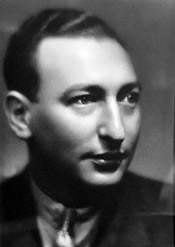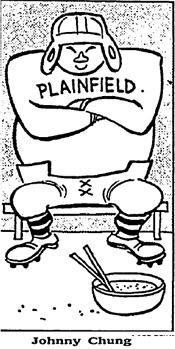The Amazing Run of Plainfield Teachers College
 Morris Newburger |
Morris Newburger was a Wall Street stock broker in 1941 and a sports fan who enjoyed Laurel and Hardy and Marx Brothers movies and pulling pranks.
He didn't believe all the scores he read in the newspaper each weekend. In particular, he refused to accept that there really was a Slippery Rock State Teachers College.
To show how easy it was to get a fictitious score in the newspaper, he called the New York Herald Tribune sports desk Saturday evening, October 15, 1941, and, giving his name as Jerry Croyden, provided the score of a small college football game: Plainfield Teachers College 27, Winona 3.
The reporter, Harold Rosenthal (who would later serve on the staff of the American Football League), asked if Plainfield was a New Jersey school and "Croyden" assured him it was. (Newburger's secretary was from Plainfield NJ.)
Rosenthal would later write: "It was not uncommon for the smallest schools to telephone their scores because of a lack of telegraph facilities. Also there were a good many small schools taking up football and dropping it continually. Teachers college were in the van in this respect." |
The score was dutifully listed the next day not only in the Herald Tribune but also in the New York Times.
At lunch at a Wall Street brokerage firm the following Monday, Morris mentioned to a fellow broker that he was quite interested in a small New Jersey college football team. The other broker bet $5 against Newburger's team. When Plainfield beat Randolph Tech 35-0, Newburger returned the $5 and explained the joke, which began to spread through Wall Street.
During the next few weeks, Newburger phoned in additional Plainfield victories (over equally nonexistent schools) to the New York papers while his friend, radio broadcaster Alexander "Bink" Dannenbaum, did the same in Philadelphia. (The two sometimes forgot to agree on the opponent and score but no matter.)
In addition, Newburger sent out a news release on Plainfield Teachers Athletic Association stationery listing Jerry Croyden as the school's publicity director.
Coach Ralph (Hurry-Up) Hoblitzel employed his unique "W Formation" in which the ends faced the backs.
The star of the team was Chinese-Hawaiian RB Johnny Chung, nicknamed the Celestial Comet. Chung gained energy by eating a bowl of wild rice at halftime.
Completing buying the story, New York Post sportswriter Herbert Allan wrote in his "College Grapevine" column: "John Chung has accounted for 57 of the 98 points scored by his unbeaten and untied team in four starts. If the Jerseyans don't watch out, he may pop up in Chiang Kaishek's offensive department one of these days."
Croyden also phoned reporters to alert them to Plainfield's undefeated season and probable invitation to the Blackboard Bowl in Atlantic City.
This led to notes appearing in midweek football columns about the team and its star RB. (Chung was supposedly the name of a worker at a Chinese laundry that Newburger patronized.)
Reporters were even contacting Croyden asking for complete lineups of the game. He filled the Plainfield lineup with names of people he liked and gave the opponents names of people he didn't like. Morris installed himself at left tackle for one game and at quarterback for another.
Meanwhile, Newburger's broker friends joined in the fun. They created linemen and assistant coaches as well as cheerleaders. Morris's Philly friends began wearing Plainfield Teachers sweatshirts. Newburger even composed a fight song for his imaginary school based on a Cole Porter hit.
|
You're the top, You're a double feature. You're the top, You're a Plainfield teacher. You're a football star, a backfield czar, unsung. You're a galloping ghost, You're just the most, You're Johnny Chung. You're not me, You're a teacher's idol. You're the key, To a Plainfield title. I'm a little man, a timid fan, a flop. But if Johnny, I'm the bottom, You're the top. |
 |
Illustration accompanying 1968 New York Times article on the occasion of Newburger's death. No way such a politically incorrect illustration would run in the Times today. |
But the plans for an undefeated season were derailed unexpectedly.
With the "team" gaining notoriety as it prepared for its final two games with Appalachian Tech and Harmony, a suspicious Herald-Tribune reporter went to Plainfield NJ to find the college.
A free-lance financial writer, one of Newburger's Wall Street circle to whom he bragged about the hoax, didn't find his stunt amusing and revealed the duplicity to Caswell Adams of the New York Herald Tribune. Adams's editor, Irving Marsh, called the Board of Education in Plainfield NJ and found that no Plainfield Teachers College existed.
After confronting Newburger, who confessed, Adams wrote a story in the Herald-Tribune that included this parody sung to the tune of Cornell's "Far above Cayuga's Waters":
Far above New Jersey's swamplands
Plainfield Teachers' spires
Mark a phantom, phony college
That got on the wires.
Perfect record made on paper,
Imaginary team!
Hail to thee, our ghostly college,
Product of a dream!
Plainfield Teachers' spires
Mark a phantom, phony college
That got on the wires.
Perfect record made on paper,
Imaginary team!
Hail to thee, our ghostly college,
Product of a dream!
Jerry Croyden issued his final press release: "Due to flunkings in the midterm examinations, Plainfield Teachers has been forced to call off its last two scheduled games."
The Philadelphia Record, which had been brought in on the hoax, rued the loss of Plainfield Teachers. It published an unsigned item titled "Football Casualty."
[The paper] regrets the passing (of Plainfield Teachers). The place had possibilities. We don't see why exposure of the gag should have to end the team's career. It should keep playing the rest of the season. We want to know how it made out with the now-cancelled games. And we want to know if the "Celestial Comet" could make All-American.
Several weeks after the end of Plainfield's "season," the Japanese attack on Pearl Harbor changed everyone's life.
Years later, actor Robert Montgomery hosted a TV show about the hoax, and Walter Winchell and other radio hosts spoke about it for years. When Newburger died in 1968, Robert Lipsyte wrote an article in the Times about the 27-year-old prank.